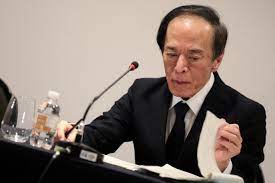The Bank of Japan has ended eight years of negative interest rates and other remnants of its unorthodox policy, making a historic shift away from a focus of reflating growth with decades of massive monetary stimulus.
News reports on the BoJ’s latest policy on Tuesday indicated that while the move was Japan’s first interest rate hike in 17 years, it still keeps rates stuck around zero as a fragile economic recovery forces the central bank to go slow in any further rise in borrowing costs, analysts say.
The new monetary policy measure makes Japan the last central bank to exit negative rates and ends an era in which policymakers around the world sought to spur growth through cheap money and unconventional monetary tools.
Commenting on the bank’s latest decision, chief Asia economist at HSBC in Hong Kong, Frederic Neumann, said: “The Bank of Japan today took its first, tentative step towards policy normalisation.
“The elimination of negative interest rates in particular signals the BOJ’s confidence that Japan has emerged from the grip of deflation”, he added.
In a widely expected decision, the Bank of Japan ditched a policy put in place since 2016 that applied a 0.1% charge on some excess reserves financial institutions parked with the central bank and set the overnight call rate as its new policy rate and decided to guide it in a range of 0-0.1% partly by paying 0.1% interest to deposits at the central bank.
The bank also abandoned yield curve control (YCC), a policy that had been in place since 2016 that capped long-term interest rates around zero.
In a statement announcing the new policy decision, the Bank maintained that it would keep buying “broadly the same amount” of government bonds as before and ramp up purchases in case yields rise rapidly as well as discontinue purchases of risky assets like exchange-traded funds (ETF) and Japanese real estate investment trusts.
The bank stated: “We judged that sustainable, stable achievement of our price target came in sight.”
With inflation rate surpassing the bank’s 2% target for well over a year, many market players had projected an end to negative interest rates either in March or April.
In what seems the bank’s likelihood of sustaining the policy moderation stance in the future, the Bank of Japan stated that it expected “accommodative financial conditions will be maintained for the time being.”




